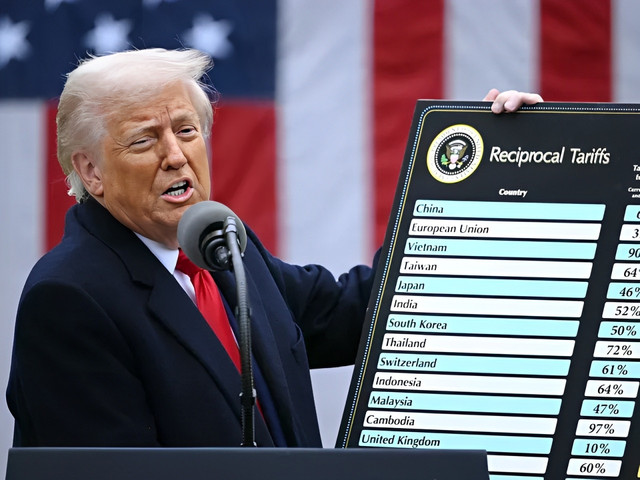Tentang KamiPedoman Media SiberKetentuan & Kebijakan PrivasiPanduan KomunitasPeringkat PenulisCara Menulis di kumparanInformasi Kerja SamaBantuanIklanKarir
2025 © PT Dynamo Media Network
Version 1.103.0
Konten dari Pengguna
Indonesia's Strategy Response to the United States Reciprocal Tariffs Policy
6 April 2025 14:37 WIB
·
waktu baca 5 menitTulisan dari Husen Muhammad tidak mewakili pandangan dari redaksi kumparan

ADVERTISEMENT
United States President Donald Trump announced the enforcement of a 32% import tariff and duty on goods from Indonesia. Referring to the decision as a step toward economic sovereignty, Trump stated that jobs and factories were beginning to return to the country, and the effects were already becoming visible. His remarks were reported by CNN during a significant national moment referred to as “Liberation Day.”
ADVERTISEMENT
The United States plans to impose a minimum tariff of 10 percent on all imported products. In addition to this general rate, certain countries will face higher, specifically tailored reciprocal tariffs. Indonesia ranks as the eighth most impacted country by these increased U.S. trade measures. The Trump-era universal tariff policy will reportedly go into effect on Saturday, April 5, while reciprocal tariffs are scheduled to go into effect on Wednesday, April 9.
Impact on Indonesia’s Economy
The newly imposed U.S. tariffs on Indonesian goods are expected to significantly reduce Indonesia’s export volume to the United States. Industries such as textiles, footwear, electronics, furniture, and agriculture will be especially affected, as they now face higher costs when exporting to the U.S. According to Eisha Maghfiruha Rachbini, Director of Indef, this situation is likely to slow production and result in job losses.
ADVERTISEMENT
In response, Indef recommends that the Indonesian government act promptly by initiating trade negotiations with the United States. Eisha stressed the importance of starting diplomatic discussions swiftly to cushion the blow of the tariff hike on exports. She emphasized that effective and strategic diplomacy will be key in minimizing the negative consequences of this trade friction.
Eisha also highlighted the need for Indonesia to capitalize on both bilateral and multilateral trade agreements, while expanding partnerships with countries that are not yet major trading partners. This strategy would allow exporters to shift their focus to alternative markets for goods affected by the new tariffs, such as footwear, electronics, and agricultural products.
ADVERTISEMENT
Echoing this sentiment, Anggawira, Secretary General of the Indonesian Young Entrepreneurs Association (Hipmi), called on the government to accelerate trade agreements with regions such as the European Union, the Middle East, and Africa. This diversification, he said, is crucial for reducing dependency on the U.S. market.
Anggawira also emphasized the importance of securing short-term business confidence by providing support for financial markets and companies hit hardest by the policy. In the longer term, he suggested that Indonesia should make full use of the Regional Comprehensive Economic Partnership (RCEP) a major trade pact involving 15 Asia-Pacific nations that together represent a third of the global economy. He concluded by urging the government to take swift and strategic action in response to the U.S. policy, warning that delays or unclear measures could lead to heightened economic instability and negative consequences for domestic industries.
ADVERTISEMENT
The Ministry of Foreign Affairs reported that President Prabowo strongly criticized the ‘Non-Tariff Barrier’ implemented by President Trump, viewing this stance as a strategic effort to enhance Indonesia’s competitiveness in the global market. "Maintaining the confidence of market players and attracting new investments are key to sustaining Indonesia’s economic growth momentum. The government will also pursue other strategic measures to further improve the country’s investment climate," the Ministry stated.
In addition, the Ministry mentioned that the Indonesian government has coordinated with Malaysia, the current chair of ASEAN, to support regional economic growth and generate wider employment opportunities. "Indonesia has reached out to Malaysia as ASEAN Chair to pursue a collective response, given that all ten ASEAN member states are impacted by the United States’ reciprocal tariff policy," the Ministry noted. The Ministry also emphasized that the U.S. tariff decision significantly affects the competitiveness of Indonesian exports, particularly in sectors such as electronics, textiles, footwear, palm oil, and rubber.
ADVERTISEMENT
As a student of international relations, I see Indonesia's strategic response to the United States' reciprocal tariff policy as a crucial test for Indonesia's economic diplomacy and trade resilience. The imposition of higher tariffs by the US, especially under the “economic sovereignty” narrative, directly challenges developing countries like Indonesia, which rely heavily on export-driven sectors such as textiles, footwear, electronics, and palm oil.
The government's efforts to immediately dialogue with the US to reduce trade tensions are important not only to protect national interests, but also to demonstrate Indonesia's commitment to fair and open trade. I believe that this path of diplomacy should be pursued in a firm but constructive manner.
ADVERTISEMENT
At the same time, I appreciate the move to reduce over-reliance on single markets such as the US by strengthening trade ties with other regions, such as the European Union, the Middle East, and Africa. This diversification strategy, coupled with greater utilization of trade agreements such as RCEP, is a smart and sustainable way to drive exports and maintain economic stability in the long run.
In addition, I believe that support for local industries and small and medium enterprises (SMEs) through incentives, improved access to financing, and capacity building is equally important. Trade policy should not only be outward-oriented, but also inwardly supportive to ensure that Indonesian businesses can adapt to global changes and remain competitive.
ADVERTISEMENT
Lastly, I commend Indonesia's proactive stance in collaborating with ASEAN partners. This reflects a strong commitment to regional solidarity and shows that ASEAN, as a bloc, can respond collectively to external trade pressures. Such regional cooperation is crucial in the face of today's increasingly protectionist global environment.
Muhammad Husen, International Relations Student, Tanjungpura University, Pontianak

